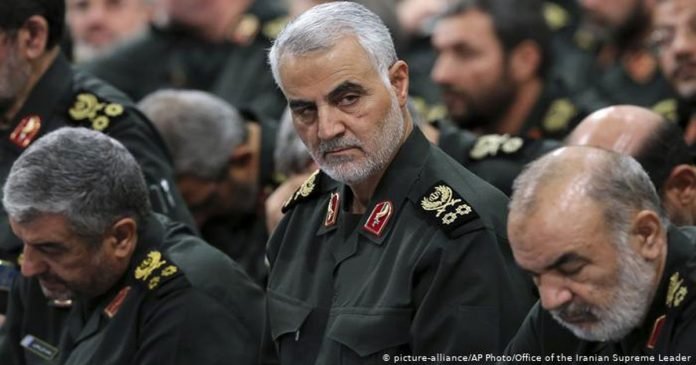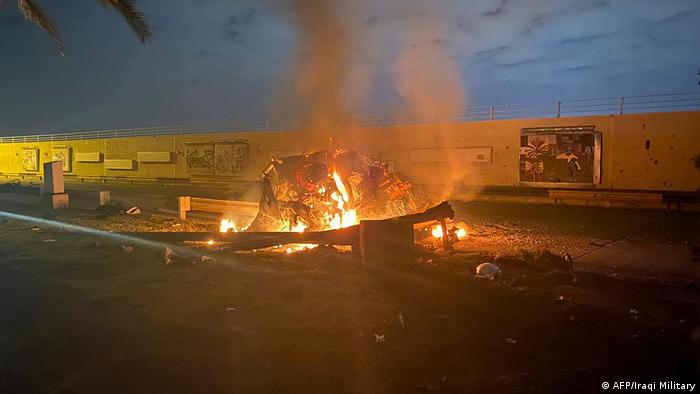The United States killed Iran’s top general in pre-dawn armed drone strike at Baghdad’s airport on Friday — triggering warnings of a “dangerous escalation” in the region.
Now Iran’s leader vows revenge on US after Soleimani’s killing, Iran’s Supreme Leader Ayatollah Ali Khamenei vowed “severe revenge” against the United States after the killing in Iraq of Qassem Soleimani, a senior commander in the Revolutionary Guards.
A near legendary figure in Iran, Soleimani headed the elite Quds force and was widely credited with significant victories against Islamic State across the region. He was killed in a U.S. airstrike as his vehicle left Baghdad airport, and his death came as a highly unexpected escalation of tensions between Washington and Tehran.
The US Defense Department said it killed Soleimani because he “was actively developing plans to attack American diplomats and service members in Iraq and throughout the region.”
The attack took Congress by surprise. Democratic presidential candidate Joe Biden said Trump had “tossed a stick of dynamite into a tinderbox” while House Speaker Nancy Pelosi warned against “provocative and disproportionate actions” that could cause a “dangerous escalation.”
It also accused Soleimani of approving the attacks on the U.S. Embassy in Baghdad earlier this week. saying: “General Soleimani was actively developing plans to attack American diplomats and service members in Iraq and throughout the region,” the Pentagon said in a statement that confirmed his death, blaming him for recent attacks on U.S. troops and the American embassy in Baghdad.
Khamenei called for three days of national mourning, and insisted that “vengeance is in store for the criminals who stained their unclean hands with his blood and that of other martyrs in the incident last night.”
He later added, in English: “His blood was shed by the most barbaric of men.”
The followers of Soleimani literally wrote that he is their commander on the US embassy compound when they attacked it. pic.twitter.com/zVnBxhDBmx
— Seth Frantzman (@sfrantzman) January 3, 2020
Who was Qassem Soleimani, Iran’s Quds Force leader?
From consolidating Iranian influence in Iraq to waging war against the “Islamic State” in Syria, General Qassem Soleimani was an instrumental figure for Iranian aspirations in the region. DW examines his life.
Moqtada al-Sadr, the populist Iraqi cleric and former militia leader, said he was reactivating his former “Mahdi Army” that fought US troops during and after the 2003 invasion.
Basem Naim, a senior figure in Hamas, said the move “opens the doors of the region to all possibilities, except calm and stability.”
Iranian Major General Qassem Soleimani, considered one of Iran’s most prolific battlefield commanders, was killed in a calculated US airstrike near Baghdad’s international airport on Friday.
He led the Iranian Revolutionary Guard’s elite Quds Force, which served as the Islamic Republic’s special foreign operations unit. Despite his influential role, he kept a rather low profile for most of his life before the 2010s.
“Soleimani is the single most powerful operative in the Middle East today, and no one’s ever heard of him,” a former CIA officer in Iraq told The New Yorker magazine in 2013.
The rise of Soleimani
Soleimani joined the Revolutionary Guard in 1979, when Ayatollah Khomenei returned to Iran and triggered the downfall of the Shah in what would become known as the Islamic Revolution.
He managed to survive the brutal war between Iran and Iraq during the 1980s to eventually take control of the Revolutionary Guard’s elite Quds Force in the 1990s. However, he did not rise to prominence and public notoriety until the 2003 US-led invasion of Iraq.
“If we go back years, there are many reports that Soleimani was in charge of attacking American soldiers, going back to 2006 and 2007,” Iraqi journalist Amir Musawy told DW.
The Iranian general has also been credited with overseeing Hezbollah tactics during the 2006 war with Israel as well as securing a ceasefire agreement between the Shiite militia group Madhi Army and the Iraqi military in 2008.
US officials have described him as a pivotal leader of Iranian ambitions in the region. According to former CIA director General David Petreaus, Soleimani once told him: “General Petreaus, you should know that I, Qassem Soleimani, control the policy for Iran with respect to Iraq, Lebanon, Gaza and Afghanistan.”
Trump was on holiday at his company’s golf resort in Palm Beach, Florida, but tweeted an American flag.
The US urged citizens to leave Iraq “immediately” and said all consular operations in Baghdad were are uspended. “US citizens should not approach the embassy,” the State Department said.
Who was Qassem Soleimani, the assassinated commander of Iran’s overseas military forces?
The tensions take root in Trump’s decision in May 2018 to withdraw the U.S. from Iran’s nuclear deal with world powers, struck under his predecessor, Barack Obama.
More recently, Tehran has seized oil tankers and shot down a U.S. military drone.
The airport strike also killed Abu Mahdi al-Muhandis, deputy commander of Iran-backed militias in Iraq known as the Popular Mobilization Forces, and five others, including the PMF’s airport protocol officer, Mohammed Reda, Iraqi officials said.
A senior Iraqi security official said the drone strike took place near the cargo area after Soleimani left his plane to be greeted by al-Muhandis and others. The official said the plane had arrived from either Lebanon or Syria.
— Donald J. Trump (@realDonaldTrump) January 3, 2020
Two officials from the PMF said Suleimani’s body was torn to pieces in the attack, while they did not find the body of al-Muhandis. A senior politician said Soleimani’s body was identified by the ring he wore.
Iraqis — Iraqis — dancing in the street for freedom; thankful that General Soleimani is no more. pic.twitter.com/huFcae3ap4
— Secretary Pompeo (@SecPompeo) January 3, 2020
It’s unclear what legal authority the U.S. relied on to carry out the attack. American presidents claim broad authority to act without congressional approval when U.S. personnel or interests are facing an imminent threat.
The Pentagon did not provide evidence to back up its assertion that Soleimani was planning new attacks against Americans.
Democratic Connecticut Sen. Richard Blumenthal said Trump owes a full explanation to Congress and the American people.
“The present authorizations for use of military force in no way cover starting a possible new war. This step could bring the most consequential military confrontation in decades,” Blumenthal said.
However, South Carolina Sen. Lindsey Graham said: “I appreciate President Trump’s bold action against Iranian aggression. To the Iranian government: if you want more, you will get more.”
Soleimani was an enemy of the United States. That’s not a question.
The question is this – as reports suggest, did America just assassinate, without any congressional authorization, the second most powerful person in Iran, knowingly setting off a potential massive regional war?
— Chris Murphy (@ChrisMurphyCT) January 3, 2020
Oil prices surged after the attack as traders feared for the heightened risk of conflict in the Persian Gulf.
Support Independent Journalism Today
Our unwavering dedication is to provide you with unbiased news, diverse perspectives, and insightful opinions. We're on a mission to ensure that those in positions of power are held accountable for their actions, but we can't do it alone. Labour Heartlands is primarily funded by me, Paul Knaggs, and by the generous contributions of readers like you. Your donations keep us going and help us uphold the principles of independent journalism. Join us in our quest for truth, transparency, and accountability – donate today and be a part of our mission!
Like everyone else, we're facing challenges, and we need your help to stay online and continue providing crucial journalism. Every contribution, no matter how small, goes a long way in helping us thrive. By becoming one of our donors, you become a vital part of our mission to uncover the truth and uphold the values of democracy.
While we maintain our independence from political affiliations, we stand united against corruption, injustice, and the erosion of free speech, truth, and democracy. We believe in the power of accurate information in a democracy, and we consider facts non-negotiable.
Your support, no matter the amount, can make a significant impact. Together, we can make a difference and continue our journey toward a more informed and just society.
Thank you for supporting Labour Heartlands










